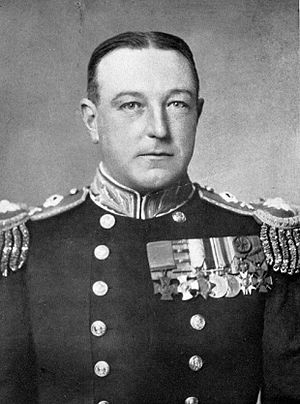Gordon Campbell (Royal Navy officer) facts for kids
Quick facts for kids
Gordon Campbell
|
|
|---|---|

Captain Gordon Campbell
|
|
| Born | 6 January 1886 Croydon, Surrey |
| Died | 3 October 1953 (aged 67) Isleworth, Middlesex |
| Buried |
All Saints Churchyard, Crondall
|
| Allegiance | United Kingdom |
| Service/ |
Royal Navy |
| Years of service | 1900–1929 1939–1943 |
| Rank | Vice admiral |
| Commands held | HMS Tiger (1925–27) HM Dockyard, Simon's Town (1922–25) HMS Impregnable (1921–22) HMS Cumberland (1919–20) HMS Patrol (1918–19) HMS Active (1917–18) HMS Dunraven (1917) HMS Farnborough (1915–17) |
| Battles/wars | First World War Second World War |
| Awards | Victoria Cross Distinguished Service Order & Two Bars Knight of the Legion of Honour (France) Croix de Guerre (France) |
| Relations | Sir Edward Campbell, 1st Baronet (brother) Brigadier Lorne MacLaine Campbell VC (nephew) |
| Other work | Member of Parliament Writer |
Gordon Campbell (born January 6, 1886 – died October 3, 1953) was a very brave British naval officer. He became a Vice Admiral in the Royal Navy. He is famous for receiving the Victoria Cross, which is the highest award for bravery in the face of the enemy for British and Commonwealth forces. He also earned other important awards from France, like the Croix de Guerre and the Légion d'honneur, for his actions during the First World War.
Gordon Campbell was born in Croydon, England. He went to Dulwich College from 1898 to 1900. After that, he joined the Royal Navy in 1900. By October 1902, he was a midshipman on the battleship HMS Irresistible in the Mediterranean Sea. He quickly moved up the ranks, becoming a Lieutenant in 1907 and a Commander in March 1916.
His incredible bravery during the First World War earned him the Victoria Cross. This happened while he was commanding a special type of ship called a "Q ship". These were disguised merchant ships that secretly carried powerful weapons. Their job was to trick German U-boats (submarines) into coming to the surface, then attack them.
The Q-Ship Trick
On February 17, 1917, Commander Campbell was on HMS Farnborough (also known as Q.5) in the North Atlantic Ocean. He saw a torpedo heading for his ship. Instead of trying to avoid it, he cleverly changed course so the torpedo would hit the back of the ship, near the engine room.
A "panic party" of sailors pretended to abandon the ship, making it look like the Q.5 was sinking. This tricked the German U-boat into surfacing. When the submarine was very close, only about 100 yards away, Commander Campbell gave the order to fire. His crew fired 45 shells, and almost all of them hit the German submarine, SM U-83, which quickly sank. Even though Q.5 was badly damaged, it was towed to safety and saved.
This wasn't the only U-boat Commander Campbell helped sink. On March 22, 1916, his ship, the Farnborough, also sank another U-boat, SM U-68.
More Bravery and Awards
Commander Campbell also commanded HMS Dunraven during a battle on August 8, 1917. His ship was sunk by the German submarine SM UC-71. Even though his ship was lost, two members of his crew, Lieutenant Charles George Bonner and Petty Officer Ernest Herbert Pitcher, were also awarded the Victoria Cross for their bravery during this battle. They were chosen by a vote among the crew members. Commander Campbell himself received a second Bar to his Distinguished Service Order (DSO) for his actions.
Life After the War
Gordon Campbell continued his naval career and eventually reached the high rank of Vice Admiral. From 1925 to 1927, he commanded the large warship HMS Tiger. He also served as a special naval assistant to King George V from 1928 to 1929.
After leaving the Navy, Campbell became involved in politics. In 1931, he was elected as a Member of Parliament for Burnley. He even defeated Arthur Henderson, who was the leader of the Labour Party at the time. However, he lost his seat in 1935.
When the Second World War began, Campbell was called back to the Royal Navy. He served as a Commander and was in charge of planning defenses against a possible invasion around Padstow.
Gordon Campbell was also a talented writer. He wrote several books, including a very popular one called My Mystery Ships, which told the story of his adventures with the Q-ships. His brother, Sir Edward Campbell, 1st Baronet, was also a Member of Parliament.
Today, Gordon Campbell's Victoria Cross medal is kept at his old school, Dulwich College, as a reminder of his incredible bravery.

